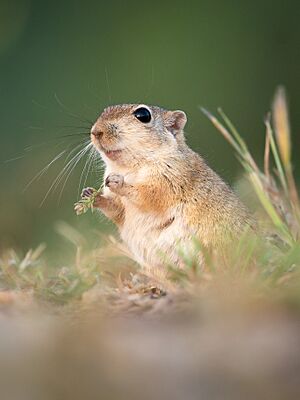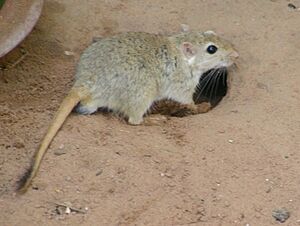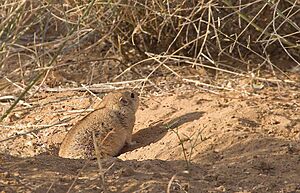Indian desert jird facts for kids
Quick facts for kids Indian desert jird |
|
|---|---|
 |
|
| At Tal Chhapar Sanctuary, Churu District, Rajasthan, India | |
| Conservation status | |
| Scientific classification |
|
| Kingdom: | Animalia |
| Phylum: | Chordata |
| Class: | Mammalia |
| Order: | Rodentia |
| Family: | Muridae |
| Genus: | Meriones |
| Species: |
M. hurrianae
|
| Binomial name | |
| Meriones hurrianae Jerdon, 1867
|
|
| Script error: The function "autoWithCaption" does not exist. | |
Script error: No such module "Check for conflicting parameters".
The Indian desert jird is a small, furry animal that looks a bit like a mouse or a rat. It's also called the Indian desert gerbil. Its scientific name is Meriones hurrianae. You can mostly find this jird living in the Thar Desert in India. Jirds are actually very close relatives of gerbils!
Contents
Where Does the Indian Desert Jird Live?
The Indian desert jird lives in dry, sandy areas. You can find them in countries like southeastern Iran and Pakistan. They are also common in northwestern India, especially in the states of Rajasthan and Gujarat.
What Does the Indian Desert Jird Look Like?
The Indian desert jird has a soft, grey-brown fur coat. Its belly is a lighter yellowish-grey color. This jird is about 12 to 14 centimeters (about 5 inches) long. Its tail is also quite long, measuring around 10 to 15 centimeters (about 4 to 6 inches).
You can tell an Indian desert jird apart by a few special features. They have short ears and long, black claws. They also have unique orange front teeth, called incisors!
Where Do Indian Desert Jirds Live?
Jirds prefer to live in deserts and dry, empty areas. They like places with firm soil, not loose sand dunes or rocky hills.
How Do Indian Desert Jirds Live?
Indian desert jirds are social animals. This means they like to live close to each other. You will often see their burrows, which are their underground homes, very near to one another. Each jird usually has at least two or more entrances to its burrow system. They often dig their entrances in the shade of a tree or close to the base of bushes.
These jirds eat a variety of things. Their diet includes seeds, roots, nuts, different types of grasses, and even insects.
How Are Jirds Different from Gerbils?
Jirds are very similar to gerbils, but there are some key differences. Gerbils usually have long hind feet and often stand up tall on them. Jirds, however, do not have these long hind feet.
A jird's tail is generally shorter than its head and body combined. They also have much shorter ears compared to gerbils. Another interesting fact is that the Indian desert jird is active during the day (diurnal). Most of the common gerbil species found in India are active at night (nocturnal).
 | Leon Lynch |
 | Milton P. Webster |
 | Ferdinand Smith |




